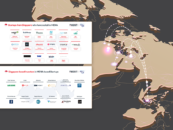The Middle East and North Africa (MENA) region is experiencing significant growth in its fintech sector, with several cities located in Gulf Cooperation Council (GCC) nations in particular emerging as globally recognized fintech hubs.
But in order to sustain this momentum, greater efforts must be put forth to fill both the talent and the capital gaps, a new report by Strategy&, the strategy consulting business unit of Big Four consultancy PricewaterhouseCoopers (PwC), says.
The paper, titled “Fintech in the Middle East: Building on the Momentum”, looks at the rise of fintech in MENA, showcasing the sector’s growth over the past years and identifying the biggest challenges hampering the growth of the industry.
According to the report, fintech has experienced remarkable growth in MENA. Between 2018 and 2022, the number of fintech hubs in the GCC increased from just one to nine. It now encompasses globally renowned centers such as the DIFC Fintech Hive and the Abu Dhabi Global Market (ADGM) in the United Arab Emirates (UAE), the Bahrain Fintech Bay, the Qatar Fintech Hub, and Fintech Saudi.

Key fintech hubs in teh Middle East and North Africa, Source: Fintech in the Middle East: Building on the Momentum, Strategy&
The fintech startup ecosystem is also expanding rapidly, growing from just 105 fintech startups at the end of 2015 to more than 800 in mid-2023. This growth has taken place on the back of soaring funding volumes, which increased from less than US$200 million in 2017 million to approximately US$885 million in 2022, a 2023 report by McKinsey says. Over the same period, the share of rounds exceeding US$10 million increased from 4% to more than 15%, showcasing that deal sizes are increasing as startups grow and mature.

Fintech disclosed deals in the Middle East, North Africa and Pakistan (MENAP), Source: McKinsey and Company, May 2023
Addressing critical challenges
Despite the growth, challenges including limited access to capital, a sluggish initial public offering (IPO) market, and talent gaps persist, hindering further development in the sector, according to Strategy&.
While venture capital (VC) investments have increased significantly, the report notes that funding levels in MENA remain below potential considering the region’s prosperity. For example, Saudi Arabia’s share of global VC funding is just 0.08% while the country accounts for 0.9% of the world’s gross domestic product (GDP).
Sovereign wealth funds currently stand as key players in the local VC funding scene, but moving forward, the private sector is expected to play a larger role, helping to create deeper markets that enable scale and thus ensure sustainable growth, the report predicts.
The second priority area is exit opportunities. In most GCC countries, the IPO market is rather sluggish, providing limited opportunities for founders to bring in other investors and exit their initial investment. In fact, in many cases, their only viable route is to sell established players. This attribute can limit the opportunities for innovation and the growth of VC investment, the report says.
Finally, the third challenge for GCC fintech is the talent shortage, an issue that’s further exacerbated by the rising demand for tech skills throughout the economy. According to Strategy&, the GCC would need to create an additional 600,000 tech jobs if the region were to reach the rank of the world’s most advanced digital economies. Without the sustained development of in-country talent, this would completely drain the GCC’s already shallow pool of talent, the report says.
According to a survey conducted by Fintech Saudi, talent and recruitment is currently the third biggest challenge faced by fintech companies in the country (43%), ahead of customer access (31%), regulation (26%) and product development (23%).
A separate study conducted by the organization found that several specific fintech-related areas need particular attention, with industry participants identifying tech experts who can build fintech infrastructure as their greatest need. Respondents also cited cloud computing, application programming interfaces (APIs), blockchain, app development, risk management and cybersecurity as the biggest expertises sought after.

Biggest challenges faced by Saudi fintech companies in 2022, Source: Fintech Saudi Annual 21/22, Fintech Saudi, Nov 2022
Concerted efforts
In the GCC, governments and private-sector entities have played a pivotal role in nurturing the growth of fintech. In Bahrain, the central bank introduced in 2017 a regulatory sandbox framework that allows businesses to test their products and services in a controlled environment. In Egypt, the EGP 1 billion Financial Technology Unit fund, launched by the central bank in 2019, provides financial support to fintech startups. In Qatar, the Qatar Financial Center introduced in 2020 the Fintech Circle, a free co-working space for qualifying fintech companies. And in the UAE, the ADGM announced in 2017 the Innovation Centre, a physical hub for fintech stakeholders to come together to collaborate.
To ensure sustained growth and global competitiveness of the MENA fintech sector, the Strategy& report says that concerted efforts are needed to address market fragmentation, strengthen capital markets, and attract talent.
The report advises for the establishment of passporting agreements between regulators in different jurisdictions of the GCC to allow startups to expand geographically without regulatory impediments, and expand rapidly.
The report also recommends several initiatives to encourage capital market growth, suggesting regulatory changes to remove hindrances to investment funds. Efforts could also include simplifying the listing process for small companies that do not possess the infrastructure to comply with requirements that were designed for larger organizations.
Regarding the talent shortage, the report suggests governments, fintech providers and other stakeholders to work with universities and educational institutions to deepen the talent pool. New initiatives should also be put in place to attract international talent, including financial incentives, recruiting campaigns and programs to nurture domestic talent.
In 2022, fintech revenue in MENA and Pakistan reached US$1.5 billion, data from McKinsey reveal. The consultancy expects that amount to increase almost threefold through 2025 to US$3.5-4.5 billion. The amount would boost fintech’s share of financial services revenue from less than 1% in 2022 to approximately 2-2.5% in 2025.
This growth will be driven by the region’s booming digital economy, its large population of young and digitally savvy consumers, and a supportive regulatory environment, the firm says.
Featured image credit: Edited from freepik








No Comments so far
Jump into a conversationNo Comments Yet!
You can be the one to start a conversation.